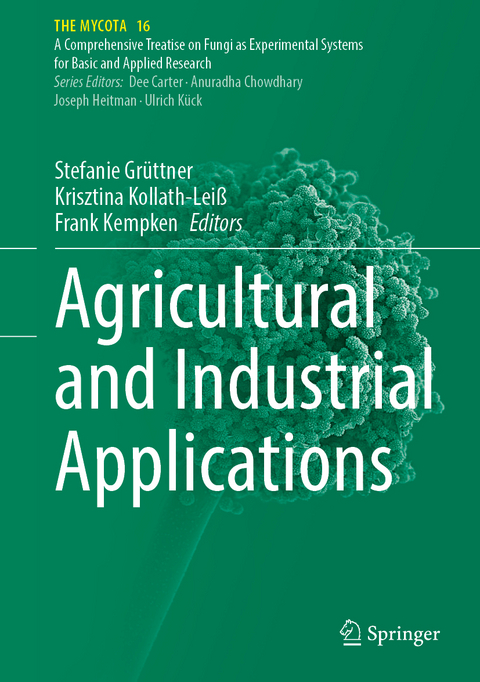
Agricultural and Industrial Applications
Springer International Publishing (Verlag)
978-3-031-81903-2 (ISBN)
- Noch nicht erschienen - erscheint am 12.03.2025
- Versandkostenfrei
- Auch auf Rechnung
- Artikel merken
This volume provides an overview of the current state of the art in agricultural and industrial mycology. It highlights the importance and potential of fungi in these fields.
Several topics relate to the critical and ambiguous role of fungi in agriculture, including beneficial and pathogenic fungal-plant interactions and food spoilage caused by mycotoxins. In addition, this volume provides a fascinating insight into ergot alkaloids. The impact of climate change on the occurrence of pathogenic fungi is also discussed.
Fungi play an important role in a wide range of industrial processes, including the fermentation of food and beverages and the biotechnological production of metabolites and enzymes. A number of specific applications are discussed in this volume, such as the production of vitamins and enzymes from marine fungi. In addition to mycologists working in industry, agriculture and academia, the book will be of interest to students of biotechnology, microbiology and mycology.
Chapter 3 is available open access under a Creative Commons Attribution 4.0 International License via link.springer.com.
Stefanie Grüttner is a research associate at the University of Kiel, Germany. In her doctoral thesis, she was working on the regulation of gene expression in plant mitochondria. After completing of her doctorate in 2021, her research interest shifted to filamentous fungi with an emphasis on genome editing of the model ascomycete Neurospora crassa.
Krisztina Kolláth-Leiß received her doctorate in 2015 at Kiel University, Germany. She is a teaching associate at the Botanical Institute and research associate in the Department of Botanical Genetics and Molecular Biology at the CAU zu Kiel. In her research, she investigates principles of polar growth in the model ascomycete Neurospora crassa.
Frank Kempken is Director at the Botanical Institute and Head of the Department of Botanical Genetics and Molecular Biology at the University of Kiel (Christian-Albrechts-Universität zu Kiel), Germany. His research interests are fungal transposons, genomics of marine fungi and auxin production of moulds. Frank Kempken was also an editor of a former Mycota edition.
Chapter 1. Industrial Production by Filamentous Fungi: Organic Acids and Vitamins.- Chapter 2. Industrial Applications of Marine Fungi.- Chapter 3. Fungal Spoilage of Crops and Food.- Chapter 4. Ergot Alkaloids.- Chapter 5. Ectomycorrhizae for the Rescue: Ectomycorrhizosphere Signaling in Agroforestry and Afforestation.- Chapter 6. Your Death, My Life: Understanding the Success Story of Necrotrophic Plant Pathogenic Ascomycota.- Chapter 7. Dance Between Environment and Fungal Pathogens in the Rhythm of Climate Change.
| Erscheint lt. Verlag | 12.3.2025 |
|---|---|
| Reihe/Serie | The Mycota |
| Zusatzinfo | VI, 192 p. 36 illus., 24 illus. in color. |
| Verlagsort | Cham |
| Sprache | englisch |
| Maße | 178 x 254 mm |
| Themenwelt | Naturwissenschaften ► Biologie ► Mikrobiologie / Immunologie |
| Naturwissenschaften ► Biologie ► Mykologie | |
| Schlagworte | Agricultural Mycology • Biotechnology • Detoxification • enzymes • Fermentation • food biotechnology • food production • Fungi • Industrial Mycology • Mycology • Mycorrhiza • Mycota • mycotoxins • Phytopathogenicity |
| ISBN-10 | 3-031-81903-9 / 3031819039 |
| ISBN-13 | 978-3-031-81903-2 / 9783031819032 |
| Zustand | Neuware |
| Informationen gemäß Produktsicherheitsverordnung (GPSR) | |
| Haben Sie eine Frage zum Produkt? |
aus dem Bereich


